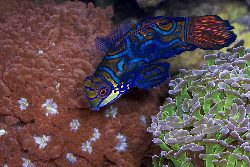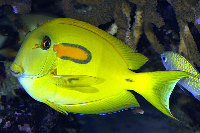 2009
2009  August 2009
August 2009  Reefkeeping 101
Reefkeeping 101
Stats:
 | Today | 3200 |
 | Yesterday | 4618 |
 | This week | 45602 |
 | Last week | 54704 |
 | This month | 69445 |
 | Last month | 217069 |
 | All days | 34082963 |
Your IP: 18.216.219.130
Mozilla 5.0,
Today: May 09, 2025
Reefkeeping 101
The Seven Habits of Highly Successful Newbies
As a corollary and companion to WaterKeeper’s Bogus Information article from last issue’s column, the intent of this article is to reinforce habits that are important for newbies to adopt. Certainly, nothing contained in this article is new or revolutionary. On the contrary, this article focuses on the well-established behaviors and practices that experienced reefkeepers often take for granted, but which may not always be obvious to newcomers. In addition to staying with mainstream concepts, I am purposely avoiding recommendations about specific equipment or practices – rather than argue why one water change schedule is better than another, I aim to give newbies a set of guidelines they can use to make decisions on their own. So, I present seven habits that will help you, as a newbie, become highly successful.
Resist the Urge to Act Impatiently
 A wise old man (probably WaterKeeper!) once said, “Only bad things happen fast in this hobby.” Except when solving problems or emergencies, it is often the case that waiting is preferable to rushing. A common question in the New to the Hobby forum is, “How soon can I add "X" to my new tank?” I often feel bad for those asking the question, since the safest answer is usually longer than they’d like it to be. If a buddy tells you that they added a mandarin dragonet to their new tank only three months after setting it up, that doesn’t mean that your tank will be ready in three months. Even if we assume that there is some mythical interval after which a particular tank is ready for a mandarin, you’d be far better off waiting longer than that interval, rather than shortening it. This hobby is a long-term commitment – many of the species we keep can live for decades if kept in a proper environment. Will it really kill you to wait until your new tank is truly stable before adding delicate livestock? On a related note, another common question in the New to the Hobby forum is, “I just bought "X" fish, how do I feed it?” Sadly, these threads often degrade into an argument over whether the tank in question is even a suitable environment for the fish, much less what the fish should be eating. The lesson here is clear – impulse purchases of livestock you’re unfamiliar with is akin to playing Russian roulette with the fish’s life. Resist the urge to rush new livestock purchases until you understand their needs.
A wise old man (probably WaterKeeper!) once said, “Only bad things happen fast in this hobby.” Except when solving problems or emergencies, it is often the case that waiting is preferable to rushing. A common question in the New to the Hobby forum is, “How soon can I add "X" to my new tank?” I often feel bad for those asking the question, since the safest answer is usually longer than they’d like it to be. If a buddy tells you that they added a mandarin dragonet to their new tank only three months after setting it up, that doesn’t mean that your tank will be ready in three months. Even if we assume that there is some mythical interval after which a particular tank is ready for a mandarin, you’d be far better off waiting longer than that interval, rather than shortening it. This hobby is a long-term commitment – many of the species we keep can live for decades if kept in a proper environment. Will it really kill you to wait until your new tank is truly stable before adding delicate livestock? On a related note, another common question in the New to the Hobby forum is, “I just bought "X" fish, how do I feed it?” Sadly, these threads often degrade into an argument over whether the tank in question is even a suitable environment for the fish, much less what the fish should be eating. The lesson here is clear – impulse purchases of livestock you’re unfamiliar with is akin to playing Russian roulette with the fish’s life. Resist the urge to rush new livestock purchases until you understand their needs.
Develop Your Senses and Be Observant
Test kits, thermometers, refractometers and the like are all wonderful tools - arguably necessary to be successful at keeping a marine aquarium. However, they are simply measurement tools – on their own, they will not solve problems. One of the most important skills that separates experienced reefkeepers from newbies is the ability to ascertain a tank’s overall condition through observation. Is a particular coral all closed up? Are normally calm fish acting hyperactive? Does the overflow sound a little odd? These simple observations can often be critically important in troubleshooting a wide range of problems with marine aquariums, but they are, unfortunately, easy to miss if your head is buried in numbers and routine tests. Successful reefkeepers typically have a sixth sense that intuitively tells them something is wrong in a tank, and helps them narrow down the source of the problem. Then, through the use of test kits or other methods, they can confirm the problem and act in an appropriate manner. Learning to develop this intuition is an important task for newbies.
Respect Murphy’s Law
When faced with an aquarium emergency, how do you react? An important factor that separates successful hobbyists from those who are less successful is how they behave when faced with a problem – even experienced reefkeepers face disaster from time to time. Deliberate, often pre-meditated action is what keeps them from losing livestock and throwing in the towel. If a bulb in your light fixture fails suddenly, do you have a spare on hand? If your automatic top-off system becomes stuck and dumps ten gallons of freshwater into your sump, are you prepared to do a quick water change? Preparing for trouble does not simply mean keeping extra supplies and equipment on hand, though – it’s the thought process you follow in a tough situation that is truly critical. When an emergency strikes, you must be able take a step back, evaluate the situation, consider your options and make an informed decision before taking any action.
Seek Long-term Stability and Consistency
 The reefs our livestock naturally live on are often violent and ever-changing environments, but one advantage they have on our measly tanks is volume. Granted, the waters immediately around a reef are extremely bio-dense, but that reef is merely a spec in a vast, mostly empty ocean. Compared to our tanks, the ratio of living creatures to water is simply off the charts. All that water plays an important role – it lends stability to the conditions on the reef. If a fish dies, that decaying biomass is diluted to the point where it’s effectively not measurable. If a fish dies in a typical home aquarium, and the carcass is not immediately removed, ammonia shoots off the chart and things go downhill quickly. The livestock we keep is simply not wired to handle these sorts of swings. Approach your quest for stability from a long-term perspective. This will help you avoid the trap of number chasing – constantly testing parameters then making huge corrections that throw something else off. Instead of behaving in a reactive way, think ahead and establish practices that will help you avoid the parameter swings in the first place. For instance, if you have a large and fast-growing coral population, you’ll be better off developing a regimented approach to maintaining calcium and alkalinity – topping off with kalkwasser, for example, rather than dumping in bottles of supplements every time you test for these parameters. Similarly, don’t wait until that hair algae problem is out of control before attempting to correct it. Instead, learn what causes algal blooms in the first place, and maintain your tank in a way that avoids those conditions. Develop good maintenance habits, and then follow them consistently.
The reefs our livestock naturally live on are often violent and ever-changing environments, but one advantage they have on our measly tanks is volume. Granted, the waters immediately around a reef are extremely bio-dense, but that reef is merely a spec in a vast, mostly empty ocean. Compared to our tanks, the ratio of living creatures to water is simply off the charts. All that water plays an important role – it lends stability to the conditions on the reef. If a fish dies, that decaying biomass is diluted to the point where it’s effectively not measurable. If a fish dies in a typical home aquarium, and the carcass is not immediately removed, ammonia shoots off the chart and things go downhill quickly. The livestock we keep is simply not wired to handle these sorts of swings. Approach your quest for stability from a long-term perspective. This will help you avoid the trap of number chasing – constantly testing parameters then making huge corrections that throw something else off. Instead of behaving in a reactive way, think ahead and establish practices that will help you avoid the parameter swings in the first place. For instance, if you have a large and fast-growing coral population, you’ll be better off developing a regimented approach to maintaining calcium and alkalinity – topping off with kalkwasser, for example, rather than dumping in bottles of supplements every time you test for these parameters. Similarly, don’t wait until that hair algae problem is out of control before attempting to correct it. Instead, learn what causes algal blooms in the first place, and maintain your tank in a way that avoids those conditions. Develop good maintenance habits, and then follow them consistently.
Recognize the Fad-driven Nature of the Hobby
Successful hobbyists are, by definition, excited about providing the very best for their livestock (more on this later!) The unfortunate consequence of this high-energy excitement is that, when new equipment, methods or tools are developed, it can be difficult to separate the truth from hype. A new lighting fixture or technology may be all the rage, but do you understand why? Or, are you interested simply because there’s a new thread about it every five minutes in the Reef Discussion forum? Clearly, development of these new concepts is important, and our hobby has plenty of room to grow. Reefkeeping is arguably one of the youngest segments of the aquarium hobby, and we are in a phase of positive and rapid growth. Without early adopters, new ideas would never get off the ground. However, before jumping on a bandwagon, make sure you understand the concept or technology in question. Does that shiny new skimmer actually skim better, or does it just look flashier? There’s nothing wrong with a flashy skimmer, but form must follow function in this hobby. Do you even understand your current skimmer well enough to evaluate its effectiveness? While it’s certainly true that successful hobbyists are often bitten by the new equipment bug themselves, it’s also the case that they aren’t afraid to continue using something that works well for them, even if it isn’t the current flavor of the month.
Aim for the Optimal, Not the Minimal
A sobering fact is that even the best aquariums most likely falls short of recreating a natural reef environment in many basic ways – light intensity, flow, availability of food, biodiversity and so on. Sadly, despite these obvious shortcomings in our practices, hobbyists are often only interested in the minimum requirements for keeping certain livestock. This is evident through many common questions on the forums: “Can I get by keeping a clam under PCs?” “Will a tang survive at least a few years in my 55?” In a way, this is only natural - hobbyists so interested in a particular specimen are hopeful that their tank can at least meet the minimum requirements to keep it alive. However, in most cases, these minimal requirements will fall far short of recreating that specimen’s natural habitat. These two thoughts leave us with a moral dilemma: If it’s just not possible to fully recreate nature, to what extent should we try? Successful reefkeepers know that the minimum is not acceptable. There is a difference between livestock that survives, and livestock that thrives. Even if we cannot fully mimic a reef in our home aquariums, making the best attempt possible will give our livestock the best chance of thriving, and will give us hobbyists a more enriching experience. At the very least, exceeding the minimum gives us a cushion in case of emergency, or in case the expert dictating that minimum was wrong!
Educate Yourself and Know Your Limits
While it is important to understand how certain equipment (tank size, for example) can limit the livestock you can keep, it’s also important to understand your own limits as a hobbyist, and work on expanding them. Do nothing for a newbie but send him on a shopping spree of high-end equipment, and you might as well just give him a copy of "Finding Nemo" – at least that way, he’ll be able to see some thriving fish! All too often, forum threads concentrate on equipment selection, do-it-yourself projects, new tank builds, and other material aspects of the hobby. Arguably even more important for a reefkeeper’s success is the skill set needed to understand and implement all those techniques. Granted, you don’t need a doctorate to run a reef tank, but it helps to understand how a protein skimmer works, and why you need one before you try to buy and operate one. Do you know what a refugium is for, or are you just cramming algae into your sump because everyone else is doing it? Educate yourself before making important decisions. Don’t bite off more than you can chew, both in terms of finicky livestock and complicated equipment. In conclusion, dear readers, it is important to step back and see the big picture from time to time. Rather than getting nervous about needing that fancy gadget or buying a pretty fish (you’ve never heard of) every time you enter your local fish store, take a deep breath and evaluate your reefkeeping habits. Make sure your overall approach is sound, and you’ll find that success comes naturally.
Got some feedback on the column? Check out the Newbie Corner Feedback Thread stickied in the New to the Hobby forum.
Photos courtesy of Greg Rothschild and Eric Borneman



